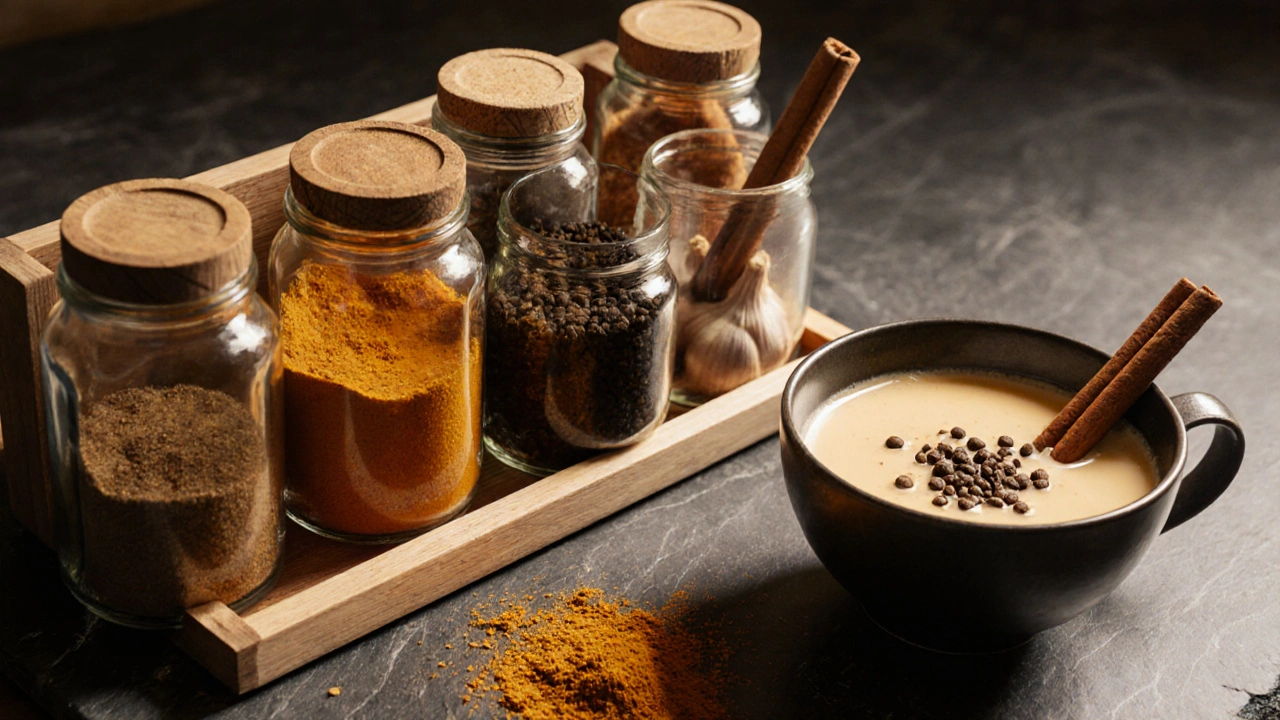Spice Health Benefits Calculator
Calculate Your Daily Spice Intake
Determine optimal amounts of healing spices based on your health goals and dietary needs.
Recommended Daily Intake
Most people use spices to make food taste better. But what if those little powders and seeds tucked in your pantry are actually powerful medicine? You’re not just adding flavor-you’re loading your meals with compounds that fight inflammation, balance blood sugar, and even protect your brain. And yet, we treat them like afterthoughts instead of the health tools they are.
Why Spices Are More Than Just Flavor
Spices aren’t new. Ancient Egyptians used cinnamon in mummification. Chinese medicine relied on ginger for digestion for thousands of years. But modern science is finally catching up. These aren’t just aromatic add-ons-they’re bioactive powerhouses packed with antioxidants, anti-inflammatory agents, and antimicrobial compounds.
Take turmeric. Its active ingredient, curcumin, has been studied in over 12,000 peer-reviewed papers. It’s not just for curry. Curcumin reduces joint pain as effectively as some NSAIDs, without the stomach damage. And it’s not just one spice. Black pepper boosts curcumin absorption by up to 2,000%. That’s why traditional recipes combine them-it’s not tradition for show. It’s biochemistry.
Turmeric: The Golden Anti-Inflammatory
Chronic inflammation is behind almost every major disease: arthritis, heart disease, even depression. Turmeric directly targets the molecules that drive this process. In a 2023 clinical trial, people with knee osteoarthritis who took 1,000 mg of curcumin daily saw pain reduction equal to ibuprofen-but with no side effects.
You don’t need supplements. Just add a teaspoon of turmeric powder to scrambled eggs, roasted vegetables, or golden milk (warm plant-based milk with a pinch of black pepper and a dash of honey). The key? Always pair it with fat and pepper. Curcumin is fat-soluble and poorly absorbed alone. Without black pepper, you’re wasting most of it.
Cinnamon: Blood Sugar’s Quiet Ally
Cravings for sugar? Cinnamon helps. In a 2024 study from the University of California, participants who ate 1 gram of cinnamon daily for 12 weeks lowered their fasting blood sugar by an average of 17%. That’s comparable to some diabetes medications.
It works by mimicking insulin and improving how cells respond to it. That means less sugar hanging around in your bloodstream, fewer energy crashes, and less fat storage. Sprinkle it on oatmeal, coffee, or even roasted sweet potatoes. Just stick to Ceylon cinnamon (labeled "true cinnamon")-the more common Cassia variety has coumarin, which can harm your liver in large doses.
Ginger: Digestion and Nausea Relief
Feeling queasy after a heavy meal? Or battling morning sickness? Ginger is one of the most proven natural remedies for nausea. A meta-analysis of 27 studies found ginger as effective as Dramamine for motion sickness, without the drowsiness.
It also speeds up gastric emptying. If you often feel bloated or full after eating, ginger stimulates contractions in your stomach, moving food along. Try a slice of fresh ginger steeped in hot water for 10 minutes. Or grate it into stir-fries and soups. Even a half-teaspoon of powdered ginger daily can make a difference.

Garlic: The Immune System Booster
Garlic isn’t just for repelling vampires. It’s packed with allicin, a sulfur compound with powerful antimicrobial and immune-boosting effects. In a 2022 trial, people who took garlic supplements daily had 63% fewer colds than those who didn’t. And when they did get sick, their symptoms lasted 70% less time.
Crush or chop garlic and let it sit for 10 minutes before cooking. That activates allicin. Add it to sauces, dressings, or roast whole cloves with vegetables. Raw garlic is strongest, but cooked still delivers benefits. Don’t toss the skins-they’re full of antioxidants too.
Black Pepper: The Unsung Hero
Most people think black pepper is just a seasoning. It’s so much more. Piperine, its main compound, doesn’t just make food spicy-it enhances nutrient absorption. It helps your body use curcumin, resveratrol (from grapes), and even beta-carotene (from carrots) more efficiently.
It also has its own anti-inflammatory and antioxidant effects. A 2021 study showed piperine reduced oxidative stress markers in adults with metabolic syndrome. Keep a grinder on your table. Use it liberally. You’re not just seasoning food-you’re upgrading its nutritional value.
Other Spices Worth Your Attention
Don’t stop there. Cardamom helps lower blood pressure. Cloves have more antioxidants than blueberries. Fenugreek seeds can improve insulin sensitivity. Oregano fights bacteria that cause food poisoning. Even cumin helps with digestion and may reduce belly fat.
You don’t need to buy expensive organic versions. Standard spices from your local grocery store work fine. Just check the expiration date-spices lose potency after 6-12 months. Smell them. If they don’t have a strong aroma, they’re past their prime.

How to Use Spices Daily (Without Overhauling Your Diet)
You don’t need to become a chef. Start small:
- Add a pinch of cinnamon to your morning coffee or tea.
- Season eggs with turmeric and black pepper instead of just salt.
- Grate fresh ginger into your smoothie or stir-fry.
- Crush a clove of garlic into your salad dressing.
- Keep a small spice grinder on the counter and grind pepper fresh over every meal.
These are five seconds of effort. But over time, they add up. Think of spices like vitamins you sprinkle on your food-except they taste better and come with zero pills.
What Not to Do
Don’t buy pre-ground spices in bulk unless you use them weekly. They lose potency fast. Don’t store them in direct sunlight or near the stove. Heat and light destroy their active compounds.
Don’t expect miracles overnight. Spices work over weeks and months, not days. They’re not magic bullets. But they’re one of the easiest, cheapest, and tastiest ways to support your long-term health.
Final Thought: Spices Are Medicine, Not Just Seasoning
When your grandmother added garlic to soup or cinnamon to apple pie, she wasn’t just being traditional. She was protecting her family’s health. We’ve forgotten that food is medicine. Spices are one of the most accessible, affordable, and delicious forms of preventive healthcare we have.
You don’t need a prescription. You don’t need a supplement bottle. Just open your spice rack. Smell the turmeric. Taste the ginger. Feel the warmth of black pepper. That’s your body thanking you-before you even swallow.
Can spices replace medicine?
No. Spices support health but don’t replace prescribed treatments for conditions like diabetes, high blood pressure, or chronic inflammation. They work best as part of a balanced diet and healthy lifestyle. Always talk to your doctor before using large amounts of spices if you’re on medication-some, like turmeric, can interact with blood thinners.
How much of each spice should I use daily?
For turmeric: 1-3 grams (about ½ to 1 teaspoon) per day. For cinnamon: up to 1 gram (½ teaspoon) of Ceylon cinnamon. For ginger: 1-2 grams fresh or 250-500 mg powdered. For garlic: 1-2 cloves daily. For black pepper: just a pinch with turmeric. More isn’t always better-balance matters.
Are ground spices as good as whole spices?
Whole spices last longer and retain more flavor and potency. But ground spices still work-just make sure they’re fresh. If they smell weak or dusty, they’ve lost their power. Buy in small quantities and label them with the date. Replace every 6-12 months.
Can kids and pregnant women use these spices?
Yes, in normal cooking amounts. Turmeric, ginger, cinnamon, and garlic are safe during pregnancy and for children. Avoid high-dose supplements unless approved by a doctor. A sprinkle in food is fine. If your child dislikes the taste, mix it into mashed potatoes, soups, or smoothies.
Do organic spices offer more health benefits?
Not necessarily. The active compounds in spices come from the plant itself, not whether it’s grown organically. But organic may reduce exposure to pesticides and additives. If budget allows, go organic for spices you use often, like turmeric or cinnamon. Otherwise, conventional is perfectly fine.






